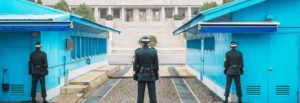by WorldTribune Staff, September 15, 2017
A delegation from South Korea’s opposition party visited Washington, D.C. this week to press the Trump administration for the “redeployment” of nuclear weapons in South Korea.
“We are here to ask for redeployment of tactical nuclear warheads in South Korea,” Lee Cheol-Woo, the head of the intelligence committee of South Korea’s National Assembly, told Washington Post columnist Josh Rogin in a report posted on Sept. 14.

The delegation to D.C. headed by Lee is from the Liberty Korea Party, the opposition to liberal President Moon Jae-In’s Democratic Party. Lee is also the chairman of the assembly’s special committee for nuclear crisis response.
In an interview with CNN on Sept. 13, Moon said he opposed the redeployment of nukes to South Korea and was also against Seoul developing its own nuclear weapons, warning it could “lead to a nuclear arms race in northeast Asia.”
Lee’s delegation is hoping the Trump administration or Congress “could help persuade Moon’s government to change its position, as it has already done regarding the deployment of the THAAD missile defense system,” Rogin wrote for the Post.
“The ruling party came to power based on their opposition to the deployment of THAAD and having tactical nuclear weapons in South Korea,” Lee said. “But if there were to be additional requests from the U.S. government, then they would have to listen to the many voices that are asking for the additional deployment of nuclear warheads.”
Lee’s delegation said support for its initiative is rising in South Korea, with a poll finding 68 percent backing the reintroduction of nuclear weapons and 60 percent supporting South Korea developing its own nuclear weapons. That survey was taken before North Korea’s test of what the Kim Jong-Un regime said was a hydrogen bomb.
U.S. sanctions on nuclear weapons in South Korea, maintained for most of the Cold War, were lifted by President George H.W. Bush in 1991.
Senate Armed Services Committee Chairman John McCain, Arizona Republican, said reintroducing nukes in the South “ought to be seriously considered.”
Trump administration officials have said they are “not ruling out the possibility, should the South Korean government request it,” Rogin wrote.
Kim Tae-Woo of Konyang University, a member of Lee’s delegation, told Rogin the benefits of the move outweigh the risks. “First of all, we want to destroy the North Korean belief that they can decouple the alliance by threatening the U.S. continent,” he said. “And also we have to destroy the Chinese belief that China can let the North Korea nuclear program go on.”
Rogin noted that “So long as Moon is in power, prospects for putting nukes back in South Korea will remain slim. The Trump administration would be unwise to publicly break with Moon on such an important issue. Alliance unity is an important signal to Pyongyang and Beijing. But ignoring the fact that North Korea’s nuclear advancement is changing the strategic situation is also deeply unwise. The only thing worse than failing to prevent a new nuclear arms race would be losing it.”
Subscribe to Geostrategy-Direct __________ Support Free Press Foundation
